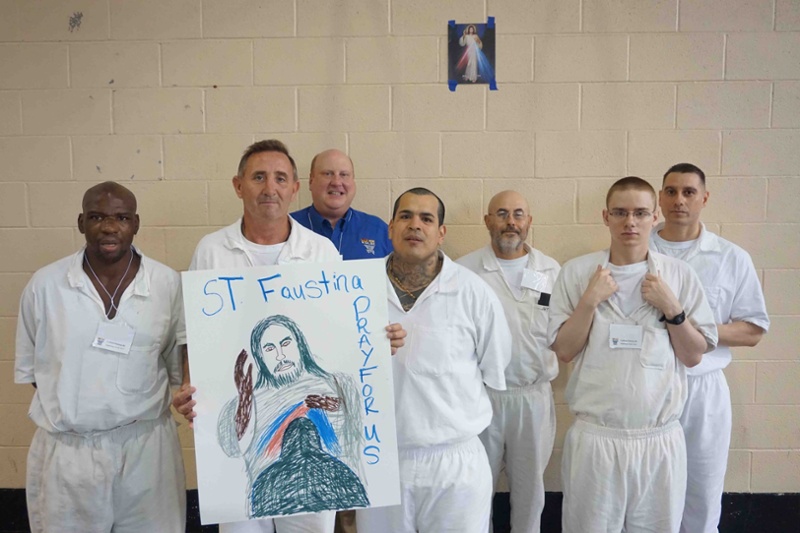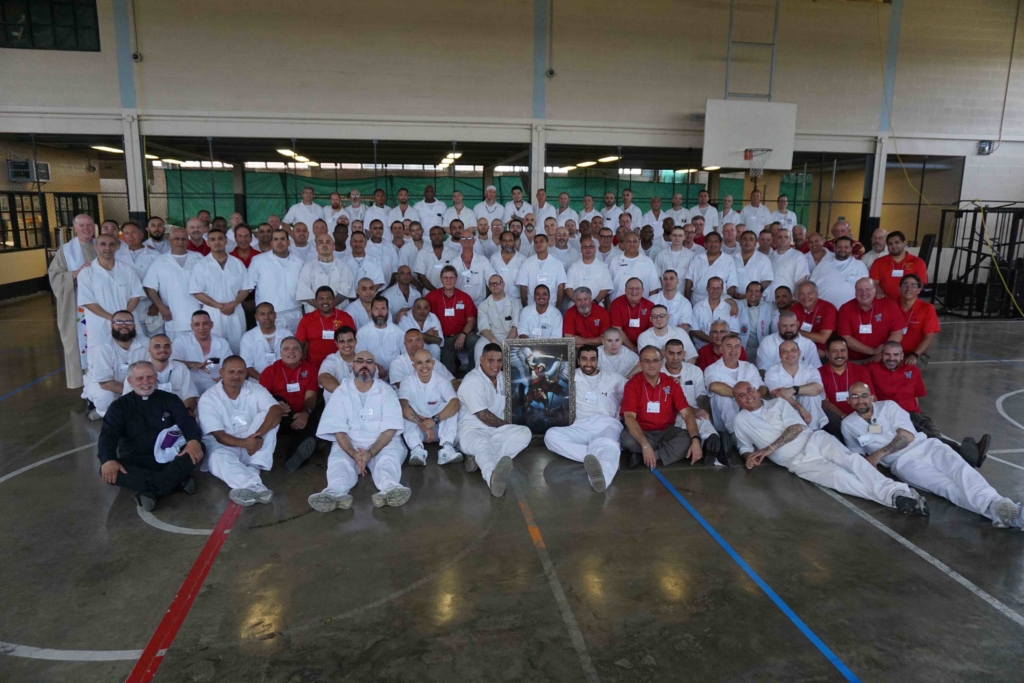For I was hungry, and you gave me food, I was thirsty and you gave me drink, a stranger and you welcomed me, naked and you clothed me, ill and you cared for me, in prison and you visited me. – Matthew 25: 35-36
No one wants to go to prison. The air in prison has weight to it. The heat in late summer forces inmates to the floors of their unairconditioned cells to seek relief on concrete. The smells that emanate from the collection of 4,100 inmates and their overseers are absurd. Some of the men I encountered will never again be free for one day in their lives because of the gravity, savagery, or number of their crimes.
No one ever wants to go to prison, but it’s something I volunteered to do.Visiting the prisoners is one of the seven Corporal Works of Mercy. Prison ministry is something I’ve been asked to take part in for the last nine years, but I’ve always found a way to say, “no.” That is, until the men on my church delivered a presentation to my daughter’s middle school about the retreat. My little girl knew just the man for the team and volunteered me on the spot.
The St. Maximilian Kolbe Prison Retreat returned for the fourth time to the maximum-security Coffield Unit of the Texas Departments of Criminal Justice (TDCJ) on September 28th – 30th. A team of 22 free men (the outside team) from St. Rose of Lima Church and other churches worked with 33 incarcerated men (the inside team) to put on the retreat. The focus of the retreat was to share Agape Love with the offenders and help them build a relationship with God. We did this by exploring matters of faith, and discerning what were the next steps for us, and the 66 offenders that attended the retreat.
Upon arriving Thursday morning at the gate to the prison, I immediately had buyer’s remorse about volunteering. The prison itself is an incredibly imposing piece of architecture. Knowing it contains some of the most brutal and vicious people on the planet was frightening to say the least.
Take courage; get up, he is calling you. – Mark 10: 49
The prison was guarded by men and women whose only real job was to contain the offenders and to make it home to their families at the end of the day unharmed. Some of the guards looked at me and the team as roadblocks to their goal. They saw 23 people who could put them at risk by saying or doing the wrong thing at the wrong time, and sparking a violent reaction from one of the offenders under their watch. Other guards were happy to see us, and were hopeful we could get through to the men who felt the rest of the world had thrown them away. They hoped we could take the edge off some of them, even if only for a few days.
The fight between good and evil is not a spectator sport, and it was time that I got in the game. I’ve been told hundreds of times by men on my team, “God doesn’t call the qualified, he qualifies the called.” Entry into the prison took about 30 minutes. We entered ten at a time through a cage with doors on either end, controlled by electric locks where you were logged as being on the grounds of the prison. Then we passed through metal detectors and on to the second cage, where we surrendered our driver’s licenses for the duration of the stay that day. We went in with no wallet, no ID, no phone. We had just the clothes on our backs, the keys to our cars, and maybe a folder with some notes.
When we exited the second cage, we were inside the prison. It was the offenders’ world, not ours. We felt it immediately and it never fully went away until we were off the prison property. But there was safety in numbers and we had guards escorting us everywhere, so we followed the man in front of us and tried no to look to scared.
As we entered the massive dual-wing gym, the inside team greeted us. We gave each other huge hugs, and told each other how glad we were to be there. We did this in front of the 66 offenders who were attending the retreat for the first time. The 66 men all looked at each other and started pointing and laughing. They must have been thinking, “Look at these guys, coming into Coffield Prison all happy, laughing and hugging everybody. They must be crazy.”
 Ten minutes later, those same skeptics were hugging us and each other. “Love you brother!” and “You’re the first visitor I’ve had in 20 years!” replaced, “Hi. Nice to meet you.” as the official greeting. The retreat was the first time these men had been given fresh fruit, salad and real meat since they were incarcerated. We brought in 100% of what they ate while on retreat. We cooked it all offsite and warmed it up onsite for them each day.
Ten minutes later, those same skeptics were hugging us and each other. “Love you brother!” and “You’re the first visitor I’ve had in 20 years!” replaced, “Hi. Nice to meet you.” as the official greeting. The retreat was the first time these men had been given fresh fruit, salad and real meat since they were incarcerated. We brought in 100% of what they ate while on retreat. We cooked it all offsite and warmed it up onsite for them each day.
I can also tell you that the offenders’ stories of abuse, their environments of neglect, and their own poor decisions dominated their explanations of how they ended up in Coffield. I learned how imperative it is that if we see someone struggling or in trouble, that we reinforce to them that tough times come and go, but some decisions are final and very costly. The offenders could pinpoint when someone with that advice might have kept them from passing the point of no return.
Finally, I can tell you some of the offenders will never be released from prison. Those men, the “lifers,” left the retreat with the confidence to teach other offenders to get right, get out, and get on with their lives. The retreat helped the offenders find a path. They made connections with each other that helped them form a community of positive influences in the most unlikely of places.
Texas has the lowest recidivism rate in the country and the second largest prison population in the country. According to statistics shared in my TDCJ volunteer training, 75% of paroled and released offenders from Texas prisons will never go back to prison. How is that possible?
Part of it is volunteers going to prisons, and volunteers helping recently released individuals get jobs, find good housing options, and continuing support for addiction and other mental health concerns. When some of the offenders that I met get out, they will have the opportunity to place a call from a mobile phone for the first time. Imagine that. When they went in, the mobile phone was science fiction. Just think about that. Where and how do they fit in our world now and in the future? If we don’t help them adjust, we might as well change the front doors to every prison to revolving doors.
The Kolbe Retreat was put together to reinvigorate the spiritual lives of the offenders by letting them know there is a forgiveness in the world and a future for the offender to live out even if they never leave prison. Offenders who are released are ready to learn, work, and be a productive part of our society. Post-release programs are in desperate need of volunteers to teach work skills, demonstrate basic fiscal responsibility, and act as mentors.
If you have any interest in assisting, I highly encourage you to follow that calling. The feeling you get helping someone break the cycle of abuse, make good decisions, and become a productive member of society far outweighs the fear of prison, and the people in them.



